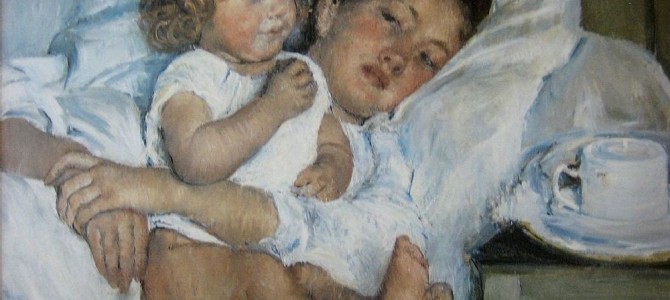
A quick scroll through social media—especially blogs, message boards, and Facebook groups populated by moms—makes it clear that a lot of mothers don’t seem to enjoy daily life with kids. The memes are all about endless laundry, tantruming toddlers, out-of-touch husbands, and a hankering for wine at midday.
In many circles, humorous commiseration between women has morphed into something less healthy. The narrative has arisen that the daily work of a mom (that is, the general care of children and maintenance of a house) is simultaneously insignificant yet also impossibly hard. It is as if the only socially acceptable way to talk about motherhood is as an illustration of the cosmic injustice of the universe.
Obviously, there is a problem. Women who unleash a steady stream of public sarcasm about the people they claim to love the most are clearly uncomfortable or unhappy. Some are probably wearied by the suffering that accompanies life on this earth. Others are probably just stuck in the rut of an unproductive habit.
The tragic thing is that motherhood doesn’t have to be that way. Taking care of a home and children (whether as a stay-at-home mom or a mom with a career) can be empowering and fulfilling. Hard, yes, like anything worth doing; but also truly awesome.
The Myth That Kills a Mother’s Joy
Women are standing in the way of their own joy because they have bought into a peculiarly destructive myth. What is this myth? It is as fatalistic as any pagan superstition. It is the idea that anything they do not know how to do cannot be done.
They do not know how to get their toddler to come when called. Therefore, toddlers aren’t controllable. They do not know how to stay caught up with the laundry and the grocery shopping. Therefore, the life of a mom is inherently a crazy cycle of unfair drudgery. They have tried—perhaps tried hard—and given up. They have decided that, like labor and delivery, all of motherhood is something to be waited out.
Rather than considering the idea that their lives could perhaps be better if they would only learn new skills and habits (or, more radically, that perhaps contemporary models of childrearing and housekeeping have failed them and they ought to seek help from different, older sources), adherents of “the myth” are more likely to lash out in fury at those who suggest it is entirely possible to overcome their maternal roadblocks.
Change Starts in Your Mind
All mothers should know four truths. One: Being a faithful (not perfect! That’s not going to happen!) mother is hard. Two: Human beings are capable of learning to do hard things well. Three: The opportunity to learn should never threaten our sense of self. Four: People enjoy what they are good at.
Of course, being willing to learn how to better serve our loved ones requires that we lay down the burden of trying to appear to be a picture-perfect mother. We must also give up our favorite false dichotomies.
We must stop acting as if, because it would be ridiculous to create a Better Homes and Gardens living room with white couches and porcelain ornaments on the coast of Nantucket while raising toddler triplets, it is therefore impossible to vacuum more than once a month. We must stop pretending that because we are not raising perfectly behaved children who like to talk about their feelings in fields of flowers until they leave for Harvard on a full scholarship, it is therefore impossible to enforce good manners as part of our house rules.
Step One: Find the Meaning
We women won’t have the emotional fuel to get good at housework and child wrangling unless we have the courage to call these tasks part of our lifework. We need to reestablish our homes as places where something valuable and productive is done and made. This requires a shift both of attitude and of habits. First of all, we need to recognize that regardless of what else we also do with our time, caring for our families is a vocation. It is the greatest gift we can give to our kids.
If this attitude does not come easily, we need to rethink why we had kids in the first place. Motherhood is not fulfilling when it is done primarily for personal fulfillment. Our kids aren’t pets, accessories, or even spouses who have sworn to love and cherish us. They are not objects who make our life more fun. They are really bad at being objects. Instead, they are human beings with their own needs and sinful human nature. It is a tremendous privilege to raise them, but we won’t recognize this until we think of motherhood as a blessed way to give to others.
Secondly, we need to build homes that center around more than the consumption of goods. The modern family has become the endpoint for a stream of entertainment, status symbols, and cheap plastic detritus. The focus tends to be on using “stuff” to save time and minimize work. Moms whose role is primarily overseeing the obtainment and use of goods are right to feel a little hollow about it all.
Our job as parents is to focus on building relational bonds within the family and teaching, disciplining, and educating our children. This includes making our kids do some of the household work. Doing so is about having a family home that is a place of creation and production rather than consumption. That is where we are able to see true meaning in what we do as moms.
Step Two: Find the Skills
Motherhood is not about luck. We don’t congratulate the triathlon athlete for being “lucky” enough to have the endurance for a race, or the doctor for being “lucky” enough to have happened to get into medical school. Neither should we act as if it’s just our bad luck that our children are habitually disrespectful in church or that they steal other kid’s school supplies. Instead, it is our job to employ an athlete’s self-discipline and medical student’s studiousness while keeping our eyes fixed on figuring out how to give our kids what they need.
We can’t learn everything at once. However, we can look at our lives and make an honest assessment. Some of our challenges are crosses to bear. Others, however, are more mutable. We can choose one aspect of motherhood to learn to do better. I am trying to learn to be more consistent with my cleaning so as to avoid the cycle of boom and bust that can leave me either embarrassed about my dirty toilets or exhausted from doing it all at once.
One danger of modern motherhood is the tendency to gauge what is “normal” by what we see among our peers or what we think we see in online forums. Unfortunately, this is too small and distorted a sample size. It can leave us either excusing our own laziness in the home or stressing out over silly parenting fads. We would be better off seeking out older women who have already raised happy, well-adjusted, kind children and who have the perspective to help us properly orient our priorities. A lot of empty-nesters in the world would be willing to share their tips on life. Hint: find the ones who have a large number of children. Those are the moms who were probably forced to learn how to thoroughly organize their home.
We can also pay attention to the other moms around us and, instead of feeling insecure when we notice that one of them always has a perfectly clean kitchen sink, ask her how she does it. She might be a great source of ideas. The beauty of learning from real people in the real world is that we can see their toddler picking his nose right in front of us. This will help prevent us from building up those false dichotomies. We can also build a more accurate sense of whether or not a given woman’s opinions are really working for her.
Blogs can be helpful, too, especially if they are written by moms with older kids. I particularly like the realistic, non-threatening approach taken by blogger Leila Lawler when she talks about “the reasonably clean house” and making sure your children wouldn’t get eaten by bears.
Don’t forget to get beyond the modern bubble entirely and read about how women living out motherhood in other eras. Read about Ma Ingalls and Mrs. Moody. Read old parenting advice and read biographies of other women from the past.
Yes, We All Need Grace
Being a mom is hard. Some days and years are harder than others. Sometimes we will nail it, sometimes we will never know whether we made the right choice, and sometimes we will totally mess up. Few things hurt more than wondering if we are inadequate at one of the most important jobs in our lives.
Yet being a faithful mother isn’t just about learning how to keep a household flowing smoothly. It’s also about our own need for forgiveness. The good news is that there is grace, even for mothers. As my own mom liked to say, “If God had wanted you to have a perfect mother, he would have given you one.”









